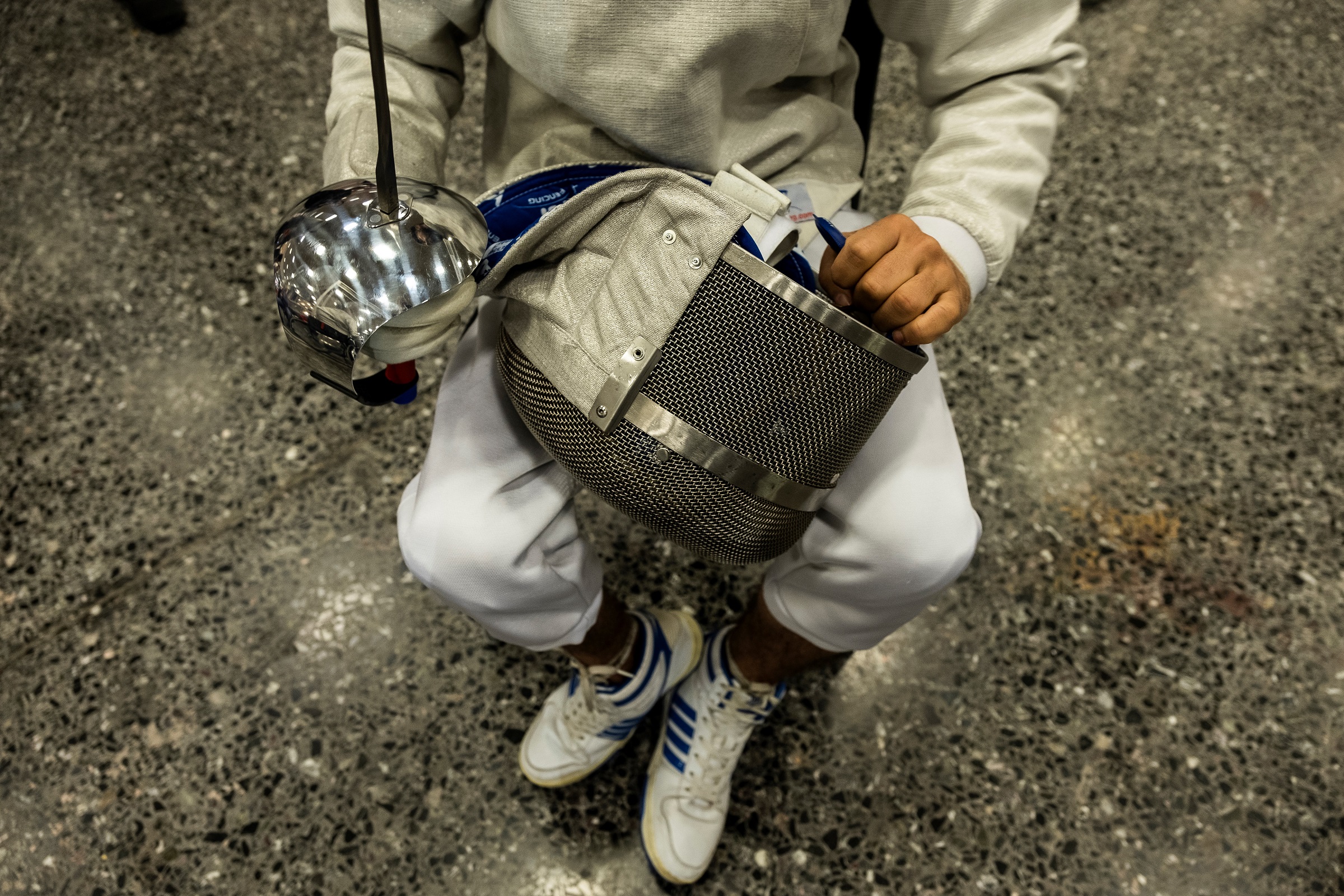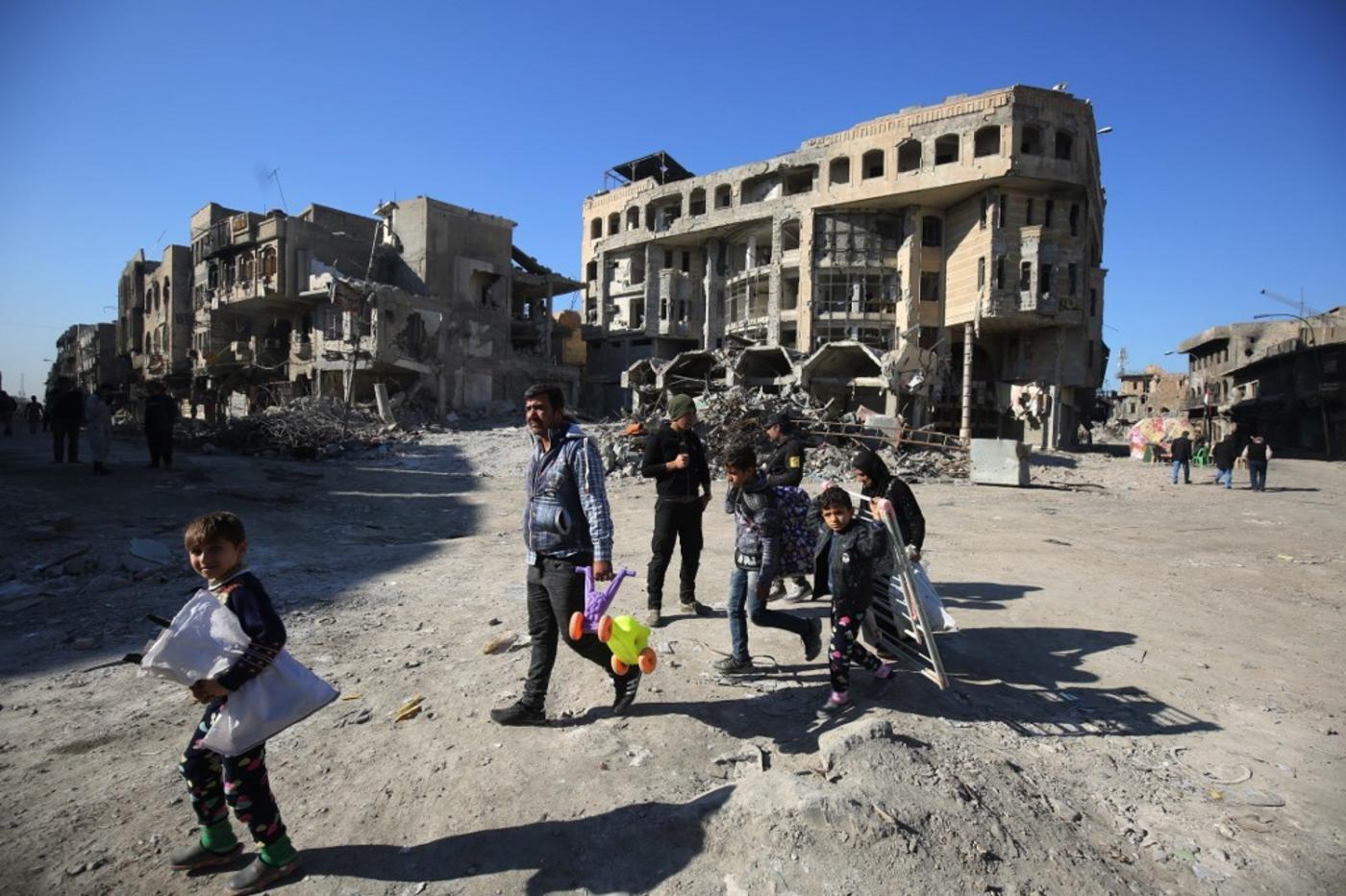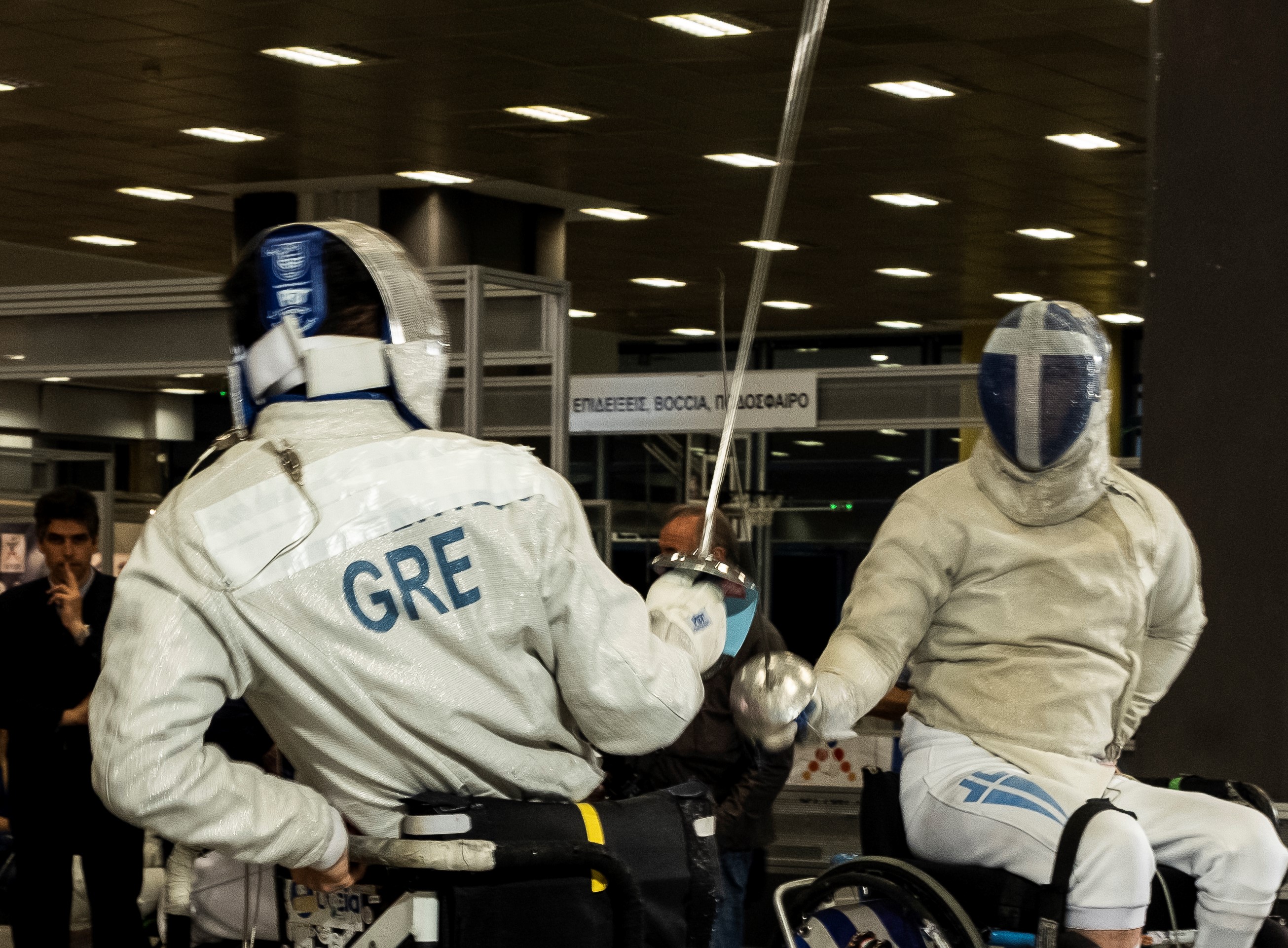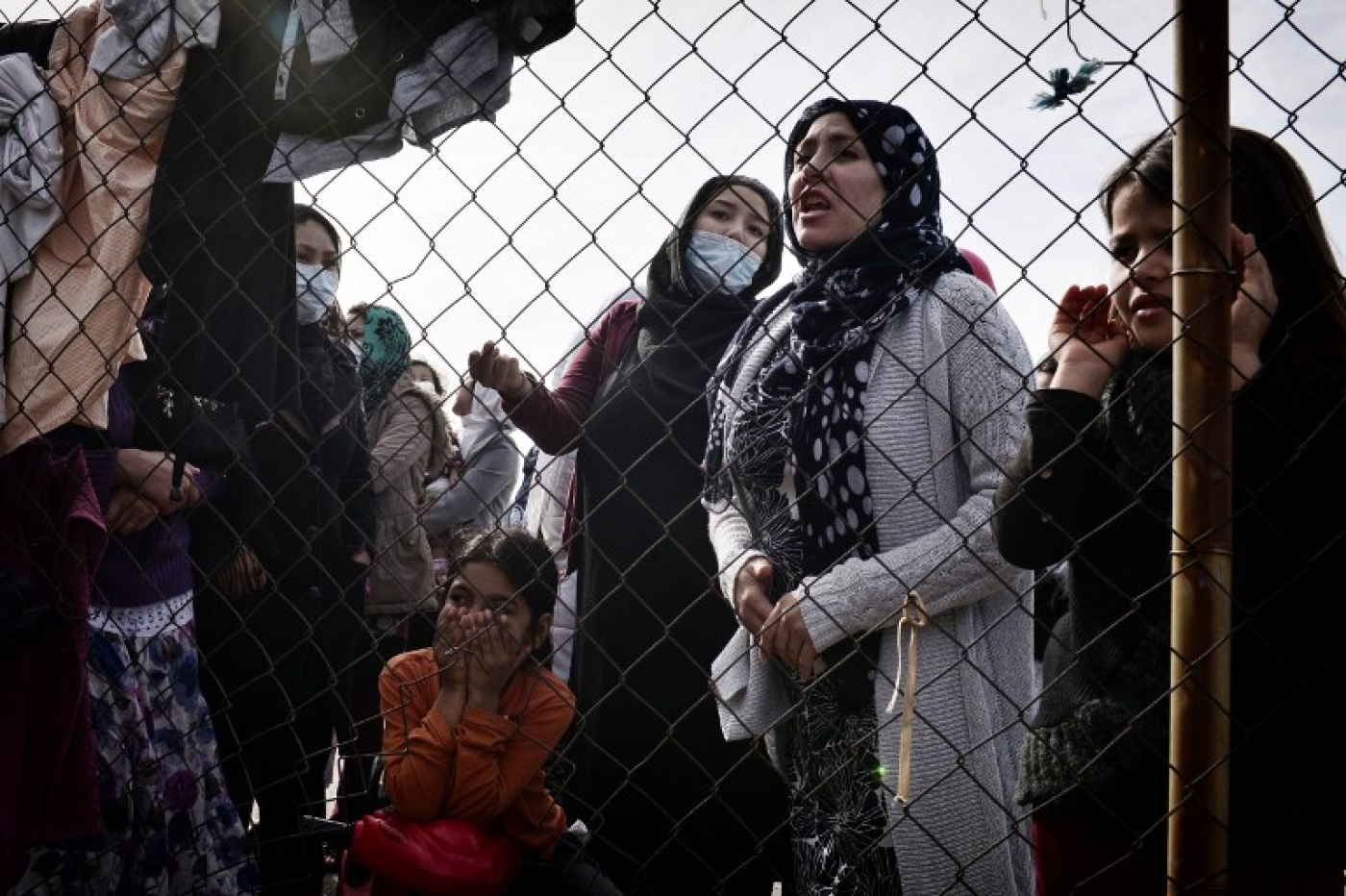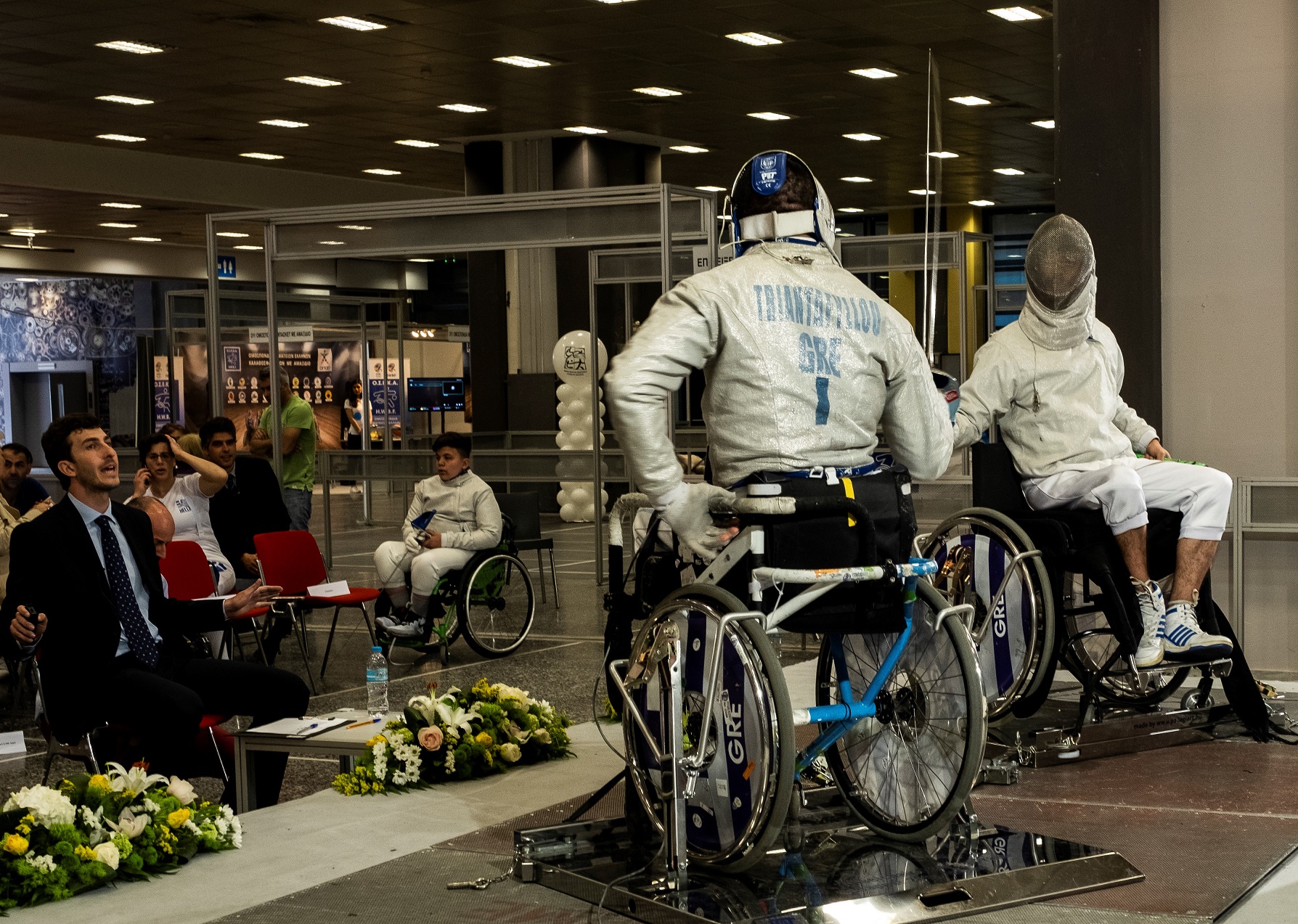He survived war and escaped to Greece. Now this Paralympian has eyes on gold

Sitting in their seats, leaning slightly forward, two dozen spectators attentively wait for the umpire’s voice to come booming over the loudspeaker.
Silence envelops the room at the Helexpo Centre in Athens and the people in it. The opponents hold their breath, their gaze on each other.
“En garde!” shouts the referee.
Both fencers lift their sabres to form an X. Still as statues, Wisam Sami, a 28-year-old Iraqi asylum seeker, and his Greek opponent wait for the signal.
Stay informed with MEE's newsletters
Sign up to get the latest alerts, insights and analysis, starting with Turkey Unpacked
“Pret, allez!” shouts the umpire, lifting his arms wide, then dropping them for the match to commence.
In a flurry of movements, Sami swings his sabre arm in a small circle, aiming for his opponent’s chest and shoulders. His challenger reacts, but it is a millisecond too late. “Touche, point!” yells the referee.
One-nil to Sami.
Although relatively new to Paralympic fencing, Sami competes with Greece’s top Paralympic fencers. “It’s good for me,” he says, grinning. "When I compete, I don’t think if I will win or lose, I just enjoy it.”
Three minutes on the clock tick away steadily as the players’ sabres cut and jab through the air. Sami steadies himself by gripping the arm of his chair with his left hand.
His specially equipped wheelchair and that of his opponent are attached to a metal rig on the floor that keeps them in place and prevents them from tipping over.
As Sami’s challenger leans in, stabbing at his chest, Sami counters with a quick downward swing while leaning back in his chair, his body now almost horizontal to the floor.
Shifting his weight upright once again, Sami rights himself and goes on the offensive: metal on metal, the point of one sabre sliding towards the hilt of the other. In a movement too fast for the eye to register, Sami makes contact with his opponent’s touch-sensitive body armour - but not before his opponent makes contact with his first.
It's now one-all.
If Sami, who came to Greece in 2016, wins enough matches today, then he could, theoretically, move onto the Grand Prix championships in Poland in July as part of the Agitos refugee team.
He would also be one step closer to his dream of reaching the Tokyo Paralympics in August 2020. But his dream isn’t a small one. Sami not only needs to train and compete more regularly, he also needs to fight Greek bureaucracy.
An independent sportsman
When he was only three, Sami’s mother took him to the hospital in Iraq for a high fever that wouldn't go away. There, he recalls, he received an injection in his right leg that left him temporarily paralysed and his limb permanently damaged. As Sami grew, his right leg shrivelled.
He now walks with a severe limp but refuses to use a wheelchair or even crutches. He is fiercely independent, a trait he says was fostered by the many hardships he’s endured in a society which still stigmatises disabled people.
“I was ostracised from the closest people [to me] - my family and friends. I was a failed person,” he says over coffee in downtown Athens.
Undeterred, Sami pushed on with his dream of becoming an athlete and, after many years of searching, he found and joined a Paralympic volleyball team in Iraq. “I watched many sports but my heart wants this. When you want something, your heart chooses it,“ he says.
'I have 3,500 friends on Facebook but nobody knows I’m doing this, not even my family'
- Wisam Sami, Paralympic fencer
Despite his efforts and success on the team, he wasn’t able to change the way that his friends and family viewed him. For this reason, he tries to avoid posting on social media, even about his victories as a Paralympic fencer in Europe. And he doesn't want to be identified in photos in his fencing gear.
“I have 3,500 friends on Facebook,” says Sami laughing, “but nobody knows I’m doing this, not even my family. When I make it to Tokyo, then everyone will know.”
Flight from Iraq
Sami fled Iraq after the Islamic State group killed his brother, a policeman, in 2014. Like thousands of other asylum seekers and migrants before him, he followed the refugee trail through Turkey, where he stayed and worked for two years, using people smugglers to move from city to city and country to country.
He came to Greece in June 2016, where he immediately applied for asylum. Since summer 2015, more than one million asylum seekers and migrants from the Middle East and North Africa have arrived in Europe, fleeing war, persecution and economic devastation.
Most entered through Italy or Greece before continuing on to central and northern Europe. Greece’s poor economy and weak social welfare have left few people wanting to create a new life there.
In March 2016, however, everything changed. The border with Macedonia, now North Macedonia, was slammed shut and the Dublin Act, which states that individuals must claim asylum in the country of first arrival, came back into effect.
Three years on, according to the United Nations High Commissioner for Refugees (UNHCR), approximately 72,000 asylum seekers and migrants remain in Greece, many of whom have received recognised refugee status and will be eligible for public healthcare and other social welfare services.
Sami's claim has been accepted, though he has yet to receive the paperwork which allows him to leave temporarily for other countries in the EU. If he cannot leave Greece, even if he wins his matches, then he cannot move onto the next round of competition.
This is why Sami believes his coach pairs him with Greece’s top fencers against whom he has little chance of winning. “If I win against these guys, I will make a very big problem for my organisation because I can’t travel,” he says.
‘Life is random’
Life for Sami in Greece has been a series of successive setbacks. “This is the truth about life here: if you are a refugee, you feel different,” he says.
Securing basic medical needs, especially as a disabled person, can make life near impossible, he says. Accommodation is often inadequate - including pop-up tents, converted shipping containers known as ISO boxes, and other makeshift shelters - and difficult for medical practitioners to access. Refugees are forced to find their way to hospitals and clinics on their own.
“If you [have to] visit the hospital, not all refugees have a translator and the doctors speak English, but not all refugees speak English,” says Sami. Unable to communicate what the problem is, many refugees, especially those with special needs, often leave empty-handed.
“Sometimes, here in Greece, you feel bad. You are random. Life is random here,” he says of the daily struggle. Being on the Agitos refugee Paralympic fencing team does not mean he gets special treatment either. After nearly three years in Greece, he is still waiting on surgery for his crippled leg.
For a system that is already heavily burdened by its own citizens and regularly under-staffed, the addition of potentially thousands more people in need could have major implications. With this new reality, humanitarian aid organisations across Greece are scrambling for solutions.
Boris Cheshirkov, a UNHCR communications officer, says: “We are continuously advocating with the state for inclusion of refugees with disabilities in the national policies and making it easier for them to access specialised services."
This includes, he continues, “the systematic integration of asylum seekers and refugees with disabilities into the national disability and mental health systems”.
In response to a growing emergency, medical programmes that specifically target refugees with physical disabilities have slowly appeared across Greece. Most, however, are short-lived due to funding issues.
Hardship for Greeks
Refugees with disabilities aren’t the only ones struggling in Greece. Many Greeks in need face the same problems.
Athenian Dimitris Degleris lost movement in both of his legs after a motorcycle accident in 2004. “The same way it’s tragic in the hospitals, it’s tragic on the road. You can’t go anywhere. We have laws, but there’s no implementation.”
Yet it’s not only the infrastructure and medical services that need upgrading in Greece, says Degleris. Social stigmas about physical and mental disabilities need to change as well.
“There is a stigma because people are not used to seeing these people (people with disabilities),” he says. “It’s how you raise people and give them the idea of what society is and what’s normal.”
Although Sami struggles with similar day-to-day issues as Degleris when it comes to navigating Greece's healthcare system, his approach is different.
Whereas Degleris strives to take part in public life to remind others that people with disabilities exist, Sami shies away, keeping even his social media feed as disability-free as possible.
This is because, as he explains, “I have not changed their view of this through the many things that I have done.”
Despite this, Sami remains positive.
“I’m proud of every day that I live and I do not have time to think about negative things. I realised that there is a power in me, that I can do many things, and that self-confidence is not in the body, but in the heart of every person."
Middle East Eye delivers independent and unrivalled coverage and analysis of the Middle East, North Africa and beyond. To learn more about republishing this content and the associated fees, please fill out this form. More about MEE can be found here.



